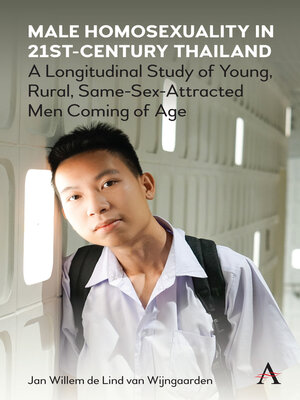Male Homosexuality in 21st-Century Thailand
ebook ∣ A Longitudinal Study of Young, Rural, Same-Sex-Attracted Men Coming of Age · Anthem Studies in Sexuality, Gender and Culture
By Jan W. de Lind van Wijngaarden

Sign up to save your library
With an OverDrive account, you can save your favorite libraries for at-a-glance information about availability. Find out more about OverDrive accounts.
Find this title in Libby, the library reading app by OverDrive.



Search for a digital library with this title
Title found at these libraries:
| Library Name | Distance |
|---|---|
| Loading... |
This book presents the very first analysis of male homosexuality in modern rural Thailand that is based on sociological/anthropological research directly with 25 young same-sex attracted men. It explores changes in the way men view and describe their sexuality over time by interviewing them three times over a period of around 18 months. The men are followed during an important transition in their lives: the end of their high school years and the end (in most cases) of their life as a child with parents or extended family at a rural home. Nearly all decided to move to a city to continue their education or to find work. Some also had stints with sex work in one of Thailand's well-known centers for prostitution. For nearly all men, this transition brought them into contact with new ideas about gender and sexuality, and many experienced an abrupt increase in their opportunities to have sex, leading to a readjustment of their moral universes. The book presents significant new insights about the Thai sex/gender system, particularly on how it is affected by processes of globalization and the ascent of the Internet and mobile phones as tools for dating and romance.
|This book presents the very first analysis of male homosexuality in modern rural Thailand that is based on sociological/anthropological research directly with 25 young same-sex attracted men. It explores changes in the way men view and describe their sexuality over time by interviewing them three times over a period of around 18 months. The men are followed during an important transition in their lives: the end of their high school years and the end (in most cases) of their life as a child with parents or extended family at a rural home. Nearly all decided to move to a city to continue their education or to find work. Some also had stints with sex work in one of Thailand's well-known centers for prostitution. For nearly all men, this transition brought them into contact with new ideas about gender and sexuality, and many experienced an abrupt increase in their opportunities to have sex, leading to a readjustment of their moral universes. The young men in the study were still in the process of figuring out who they were/wanted to be, and many contradictions emerged in their narratives over the period of data collection. These contradictions, and the way they were resolved, presented an opportunity to critically explore the way the social structures in which these young men operate influence the way they think and explain their own sexual/gendered selves, and how changes in these social structures affect their sense of self.
A number of explanatory 'lenses' are used in the different book chapters that zoom in on different structuring/explanatory frameworks for making sense of gender and sexuality in Thai cultural contexts, as used and applied by the study participants. The first is Buddhism. Buddhist beliefs and traditional ideas about karma, fate, hierarchy, family, masculinity and femininity played important roles in the young men's childhood understandings about homosexuality and same-sex relations– especially in terms of their cause and morality. The second lens for understanding male homosexuality in Thailand is gender, where men are divided into feminine-oriented bottoms and masculine-oriented tops. A third lens is modernity/the desire to develop and grow, closely linked to Thailand's globalizing economy and the increasing role of the Internet and social media. The Internet functioned as an important 'playground', a platform for trying-out different presentations of the self via Facebook and chat applications – and in many men this resulted in a rejection of their previous self-presentation...







